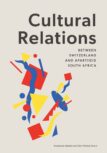Cultural Relations Between Switzerland and Apartheid South Africa
- Language: English
- ISBN: 978-3-906927-74-9
- eISBN: 978-3-906927-75-6
Cultural Relations Between Switzerland and Apartheid South Africa
In the decades after the National Party of South Africa assumed power in 1948, a close economic relationship evolved between South Africa and Switzerland, whose longstanding refusal to join international boycotts enabled it to advance to being one of the apartheid state’s most important business partners. But alongside trade in gold, diamonds and much more, the two countries also enjoyed manifold relations in the cultural field, both “official” and “unofficial”. Swiss musicians toured South Africa with state assistance, plays by Friedrich Dürrenmatt and Max Frisch were performed there in English and Afrikaans, South African jazz artists such as Abdullah Ibrahim (aka Dollar Brand), Sathima Bea Benjamin and Chris McGregor found enthusiastic audiences in Switzerland, and in the 1970s the plays of Athol Fugard began to be seen on Swiss stages and heard on national radio.
Cultural objects, performances and lives moved between these two countries, accruing symbolic value even as artists themselves often bore the costs—in substance abuse, exile, censorship, domestic violence and early death. The essays in this book reframe Switzerland not only as an enabler of apartheid-era cultural life, but as a site refracted through South African critique.
The essays in this book cover a multitude of topics from jazz to classical music, architecture, linguistics, theatre and literature in translation. (They are derived in large part from the papers given at a conference held in Basel in May 2023, funded by the Swiss National Science Foundation (SNF), and organised by the Basler Afrika Bibliographien (BAB) in collaboration with the Bern Academy of Arts and the Centre for African Studies at the University of Basel.) The authors investigate the activities of official state actors and private individuals, institutions and organisations in order to elucidate understandings and misunderstandings in a field where meanings and intentions were fluid, and where cultural relations existed in a complex process of give and take.

